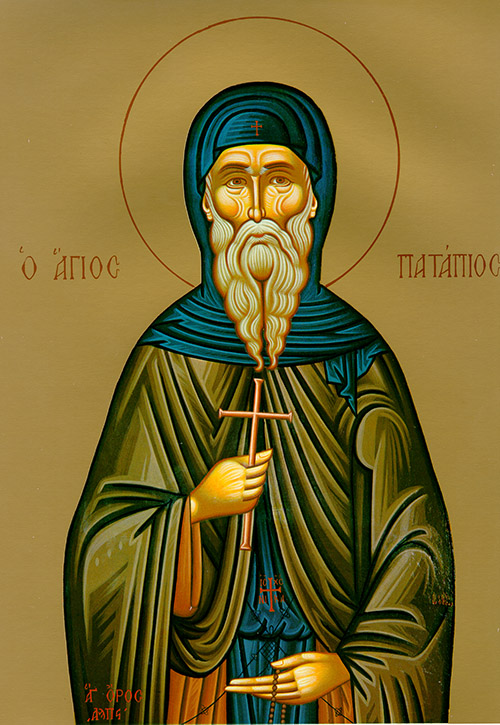

Our venerable father Patapius was born at Thebes into a pious Christian family. Reaching the age of maturity, he scorned the vanities of the world and so went into the Egyptian desert where he became known for his ascetic deeds. Though he wished to dwell in silence, people began to come to him for advice. He went eventually to Constantinople, where he obtained a cell at the city wall, near the Blachernae church. But here, too, he quickly became known. The sick began to throng about, and he, having been granted the gift of healing, began to help all the needy. After a life adorned with virtue and miracles, St. Patapius fell asleep in the Lord and was buried in the church of St. John the Baptist in the 7th century.
In you, O father, the divine image was strictly preserved; taking up your cross, you followed Christ. You taught us by example how to spurn the flesh, for it passes away, and how to care for the soul, which is immortal. Therefore, O venerable Patapius, your soul rejoices with the angels.
The people who come to your temple with reverence, O Holy One, as a place of spiritual healing, ask to receive healing of their infirmities and forgiveness of sins which they have committed in their lives. For you are revealed, O venerable Patapius, as an intercessor for all in need.
Hebrews 8: 7-13
Brothers and sisters: If that first covenant had been faultless, there would have been no place for a second one. But God, finding fault with them, says, “Days are coming, says the Lord, when I will make a new covenant with the house of Israel and with the house of Judah. It will not be like the covenant I made with their fathers the day I took them forth from the land of Egypt; for they broke my covenant and I grew weary of them, says the Lord. But this is the covenant I will make with the house of Israel after those days, says the Lord: I will place my laws in their minds and I will write them upon their hearts; I will be their God and they shall be my people. And they shall not teach their fellow citizens or their brothers, saying, ‘Know the Lord,’ for all shall know me, from least to greatest. I will forgive their evildoing, and their sins I will remember no more.”
When he says, “a new covenant,” he declares the first one obsolete. And what has become obsolete and has grown old is close to disappearing.
Mark 8:11-21
At that time the Pharisees came forward and began to argue with Jesus. They were looking for some heavenly sign from him as a test. With a sigh from the depths of his spirit Jesus said: “Why does this age seek a sign? I assure you, no such sign will be given it!” Then he left them, got into the boat again, and went off to the other shore.
They had forgotten to bring any bread along; except for one loaf they had none with them in the boat. So when Jesus instructed them, “Keep your eyes open! Be on your guard against the yeast of the Pharisees and the yeast of Herod,” they concluded among themselves that it was because they had no bread. Aware of this Jesus said to them, “Why do you suppose that it is because you have no bread? Do you still not see or comprehend? Are your minds completely blinded? Have you eyes but no sight? Ears but no hearing? Do you remember when I broke the five loaves for the five thousand, how many baskets of fragments did you collect?” They answered, “Seven.” He said to them again, “Do you still not understand?”
Icon courtesy of Jack Figel, Eastern Christian Publications – ecpubs.com
Sunday, December 8 –